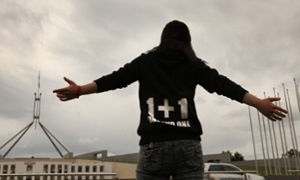
Abortion will remain a crime in New South Wales after the state election with neither of the major parties committing to reform despite a grassroots campaign by women’s rights groups.
Women are able to have abortions under technicalities around their physical and mental health.
But Melanie Fernandez, chair of Women’s Electoral Lobby (WEL) NSW, said she was not optimistic about decriminalising it despite the group meeting ministers, shadow ministers and telling their members to lobby their MPs.
“We’re running a public education campaign around decriminalisation and calling on supporters to approach their candidate and get their views on how they would vote on a conscience matter. But we recognise the make up of the current parliament is probably not conducive to bringing in changes,” she told Guardian Australia.
“Whether or not there’s going to be a discussion about legislation, we’re probably yet to see.”
A spokesman for premier Mike Baird said he had no plans to alter the abortion laws in anyway if the Liberal party was re-elected to government while a spokeswoman for opposition leader, Luke Foley, said Labor had “no intention” of changing current legislation.
“Labor has also said it would work with the federal government and Medicare to get better data on terminations, this is so the state can determine why women are having terminations from a public health perspectivem,” Foley’s spokesman said.
A bill known as Zoe’s Law passed the lower house of the NSW parliament in 2013 after being introduced by the Liberal party MP, Chris Spence. The bill’s aim was to make it a crime for injuring or killing a foetus older than 20 weeks old without the mother’s consent and was allowed to lapse after a public backlash grew.
Brodie Donegan, who lost her daughter Zoe at 32 weeks pregnant when she was hit by a drugged driver, had lobbied for the law change after Zoe was listed as one of her injuries in court, and not counted as a life lost in the charges against the driver.
However, pro-choice advocates argued it would put the already tenuous provisions for abortion in NSW at risk by giving personhood to a foetus older than 20 weeks.
Donegan has previously told Guardian Australia she planned to lobby for a another version of Zoe’s Law once the NSW election was over.
“I think this bill has been tainted by conspiracy theories,” she said.
“I think people forget it happened to me and my partner and we’re just trying to do something that would make an offender committing a crime which caused the loss of a baby against the mother’s consent a crime, that’s what we want, them to be charged with also causing the death of a baby.”
Fernandez said the issue was a “watching brief” for WEL as the group knew there was a still appetite for another version of Zoe’s Law.
WEL is circulating data on who in the lower house voted for the bill so their supporters are aware where particular politicians stand and Fernandez said abortion should be legislated under the health act, not the criminal act.
Foley announced Labor’s plan for women in the workplace on Monday, saying a Labor government would change anti-discrimination laws to better protect women who have children, create a dedicated unit with the office of industrial relations to address discrimination against pregnant women and mothers, set a target of 40% of senior position in public sector to be filled by women by 2019 and set a target of 50% of new board and committee appointments made by government to be women by 2016.
“Discrimination in the workplace is not only a psychological and physical distress for the person being unfairly targeted, discrimination represents a significant financial burden to the NSW economy of at least $8bn a year,” Foley said in a statement.
“Despite the overwhelming evidence that government needs to do more in this area, the Baird Liberal Government has been asleep on the job and its own Minister and department appear to have no interest in or intention to act on this unacceptable situation.
“This indifference to the vulnerabilities of women in the workplace extends not only to the wider workforce but also to the NSW public sector. It is astounding that neither the Minister for Industrial Relations or the Office of Industrial Relations has any plan to respond to pregnancy and return to work discrimination in the public sector.”
The policies are supported by WEL who also have a scorecard on how the parties rate on issues that affect women, including funding for shelters and housing affordability.
Fernandez said Greens rated best overall, though the lobby group wanted to see more of their costings.
